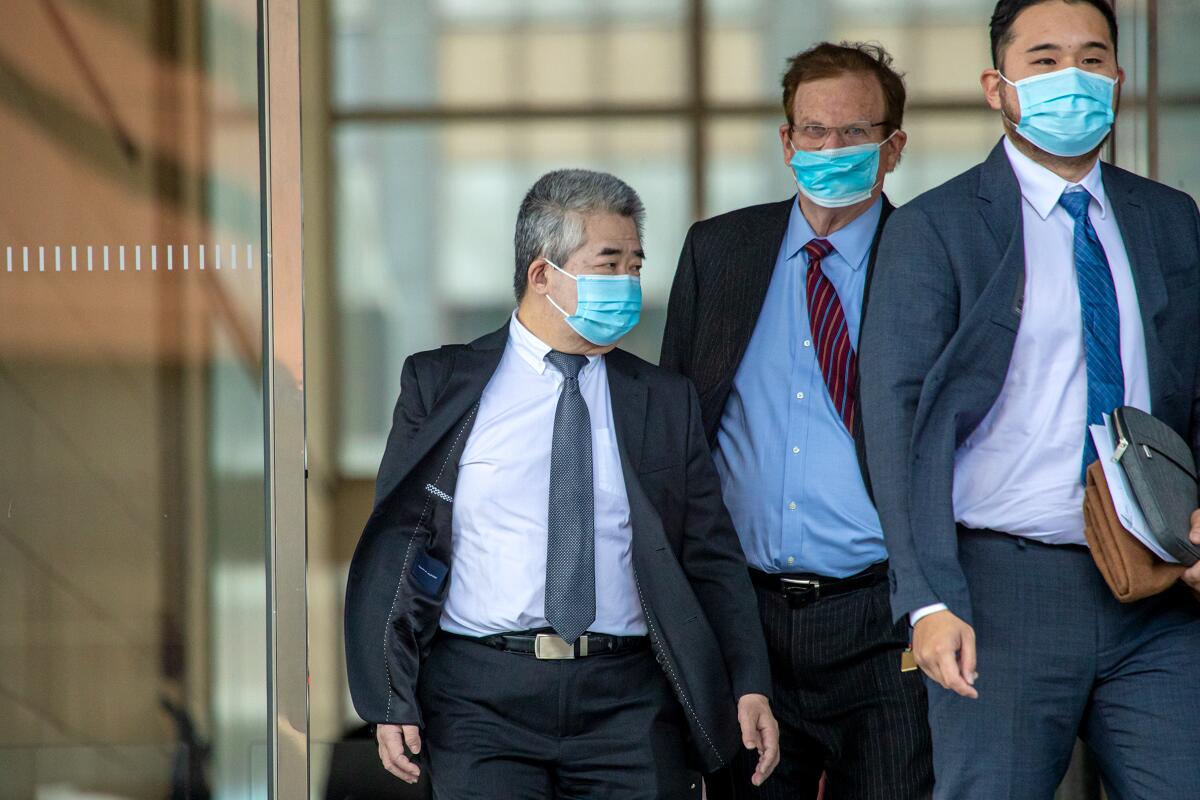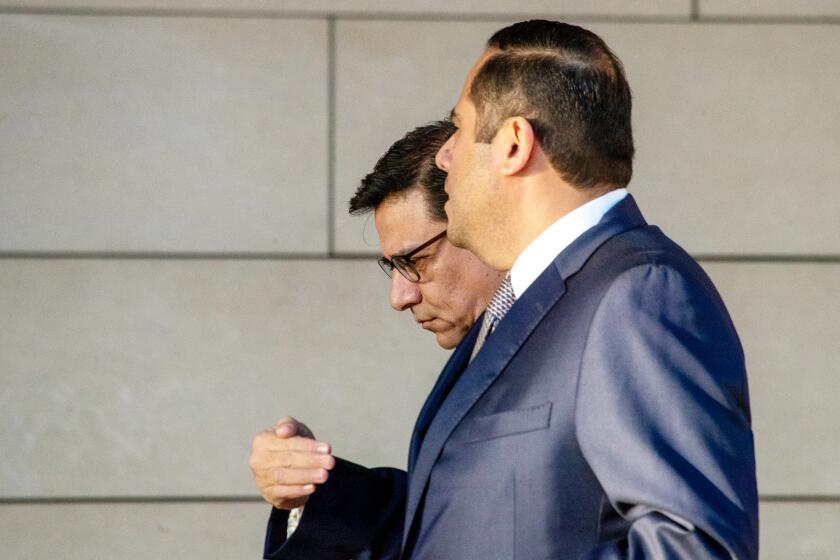Ex-deputy mayor accused of taking bribes as L.A. City Hall graft trial opens

A federal prosecutor told a jury Tuesday that former Los Angeles Deputy Mayor Raymond Chan was a central player in a sprawling extortion racket that corrupted downtown development projects for years.
In an opening statement at Chan’s criminal trial, Assistant U.S. Atty. Susan Har accused him of playing multiple roles in a shakedown scheme led by Jose Huizar when Huizar served on the City Council.
Chan accepted tens of thousands of dollars in bribes, Har said, while also serving as a go-between who facilitated payoffs by Chinese developers to the councilman.
“They needed one another for the pay-to-play scheme to work,” the prosecutor told the jury.
Huizar used Chan, a Chinese immigrant, to extort the developers, Har said, while Chan got the powerful councilman to shepherd their projects through the city’s byzantine approval process.
Chan’s attorney, Harland Braun, told jurors his client was innocent and urged them to keep an open mind until Chan takes the stand and testifies after prosecutors rest their case.
“You’ll find out that the story the government just gave you is not true,” Braun said.
Defying an order by U.S. District Judge John F. Walter, Braun cast the prosecution as motivated by anti-Chinese bias, an allegation the government denies and Walter has ruled off limits.
“Chinese this, Chinese that,” Braun said, adding a moment later, “Stop using race.”
Walter sustained Har’s objection to Braun’s line of attack. Braun persisted. “It’s not a crime to speak a foreign language,” he told jurors.
Chan, who had been general manager of the city’s buildings department for three years when Mayor Eric Garcetti promoted him to deputy mayor in 2016, is charged with racketeering, bribery, wire fraud and making false statements to the FBI. Chan left his city job in July 2017 and became a consultant to developers.
Former L.A. City Councilmember Jose Huizar pleads guilty to racketeering and tax evasion, admitting he extorted at least $1.5 million from developers.
A challenge for Chan will be to refute the testimony of three witnesses who have pleaded guilty to felonies and admitted their roles in bribe schemes: Chan’s former business partner George Chiang, real estate consultant Morrie Goldman and Huizar’s former aide George Esparza.
Huizar, who has admitted taking more than $1.5 million in bribes, implicated Chan when he pleaded guilty last month to racketeering and tax evasion, but the former councilman is not expected to testify.
Prosecutors plan to play recordings of wiretapped phone calls and other covertly taped conversations between Chan and witnesses who were working with the FBI.
Braun tried to undermine their credibility, telling jurors they “can’t rely on a witness who’s a convicted felon.” Braun singled out Chiang, an admitted bagman, as especially untrustworthy. Chiang says he passed along more than $100,000 in developer bribes to Chan.
“If he’d been a little more with it,” Braun said of his client, “he’d have seen that George Chiang was a crook.”
Braun tried to distinguish Chan from others ensnared in the case, noting that unlike Huizar and Esparza, Chan never accepted casino gambling chips, private jet flights, luxury hotel stays and other favors on more than a dozen lavish Las Vegas holidays funded by a Chinese skyscraper developer.
Braun questioned the strength of prosecution evidence that Chan helped arrange that developer’s $600,000 loan to Huizar to settle a sexual harassment lawsuit that threatened his 2015 run for reelection. When the developer, Shen Zhen New World I, was convicted of bribery and wire fraud in November, the jury found the loan was an illegal payoff.
Har told the jury the case against Chan boils down to a conspiracy “to get money, keep power and avoid the feds.” Chan, she said, took advantage of an influx in Chinese developers pursuing projects during a downtown L.A. real estate boom.
“The defendant saw an opportunity to make himself the indispensable person in the middle,” Har said.
Raymond Chan, a deputy mayor who oversaw economic development for L.A. Mayor Eric Garcetti in 2016 and 2017, has been charged with conspiracy, bribery and other crimes.
As deputy mayor, Chan became a secret business partner with Chiang, who was hired by an arm of Chinese developer Shenzhen Hazens as a consultant on its proposed Luxe City Center Hotel project near what was then called Staples Center, according to Har.
Prosecutors say Chan solicited more than $100,000 in bribes on the project, which was never built, in return for city approvals. Har told the jury that Chan was careful not to accept the money from Chiang until after he left his job as deputy mayor.
Jia Yuan USA Co., the local subsidiary of Shenzhen Hazens, reached an agreement with prosecutors to pay the government a $1,050,000 penalty to resolve the government’s investigation of the matter. The deal required the developer to fire Chiang as its consultant and improve its compliance program.
More to Read
Sign up for Essential California
The most important California stories and recommendations in your inbox every morning.
You may occasionally receive promotional content from the Los Angeles Times.












